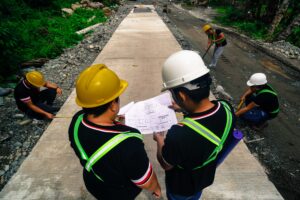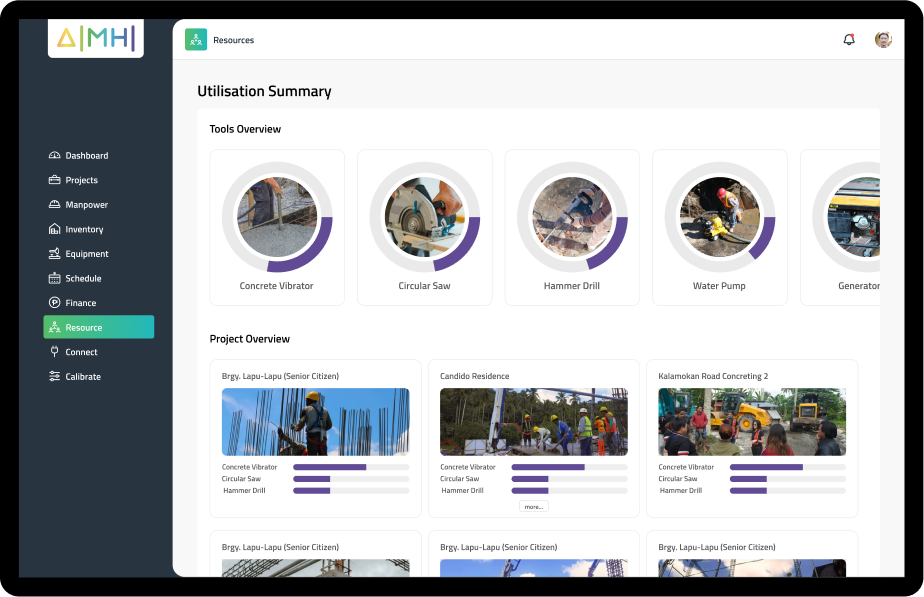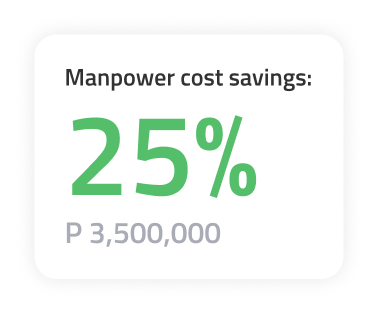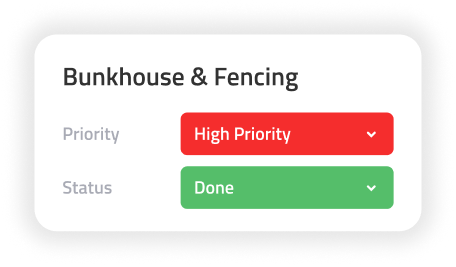The construction industry is notorious for its heavy paperwork. From estimates and purchase orders to progress reports and change orders, managing this paper trail can be time-consuming. Delays caused by misplaced documents, inaccurate data entry, and inefficient communication add even more frustration to the equation.
Paperwork burdens contribute to process-related internal factors affecting construction efficiency. A 2022 study found that projects lacking an effective construction workflow often produce incomplete and defective documentation. Consequently, these flawed documents lead to incomplete paperwork, a prolonged review process, and planning challenges, all of which slow the construction workflow and cause delays.
Artificial Intelligence (AI) offers promising solutions to the paperwork challenges in construction. AI systems usually reduce the risk of human error and ensure that all documents are accurately filed and easily retrievable.
AI-powered tools streamline communication by centralizing information and providing real-time updates to all stakeholders, which helps prevent misunderstandings and miscommunications.
Moreover, AI features enhance project planning and execution by analyzing vast amounts of data to identify potential issues before they become problems. This predictive analytics forecast delays and suggest adjustments to keep the project on track.
Additionally, AI can optimize workflows by learning from past projects, and continuously improving efficiency, productivity, and decision-making.
Construction AI offers features beyond those found in typical AI-driven project management platforms. AIMHI (Artificial Intelligence Meets Human Intelligence) brings AI in construction to a whole new level, positioning itself as a construction gamechanger.
In this article, we’ll dive into how AI further helps eliminate construction paperwork and prevent project delays, and how AIMHI incorporates these new features into their enhanced software.
1. Reduces Paperwork Through Document Automation
AI eliminates manual data entry for tasks like progress reports, change orders, material estimates, and other documents based on the captured real-time data from the project site. This cuts manual creation and complex estimation, potentially doing away with spreadsheets in putting together project calculations.
One concrete example is AIMHI’s estimator help widget, assisting users with conversions, formulas, and calculations. The software also provides an initial scope of work baseline for projects, saving time by offering predefined scopes based on project type. This ensures that similar projects start with a consistent framework, covering common elements such as permitting, bunkhouses, and excavation.
Furthermore, AI enhances productivity tracking. When users enter estimated worker or equipment quantities, AIMHI compares these figures against productivity baselines to offer insights. This helps identify if productivity levels are above or below average, aiding in delay risk analysis and manpower productivity assessment.
2. Reduces Paperwork Through Centralization
AI-driven construction management centralizes document management, storing all project documents in a single, cloud-based platform. This eliminates the need for paper filing and simplifies document retrieval. Team members can access critical documents anytime and from anywhere, ensuring everyone works with the most up-to-date information.
Centralizing documents allows easy sharing and review without waiting for physical document transfers, reducing project delays. It also makes it easier to demonstrate adherence to regulations and standards. This comprehensive approach promotes project efficiency, accountability, and construction paperwork reduction.
3. Prevents Delays Through Proactive and Predictive Features
AI in construction management proactively identifies and addresses potential delays through predictive risk assessment and recommender system.
Predictive AI (Risk Assessment)
This feature identifies potential risks caused by several factors, promoting:
- Equipment productivity
- Cost overrun
- Manpower productivity
AI construction project management software like AIMHI analyzes weather forecasts to predict disruptions and suggests proactive mitigation plans. It also evaluates cash flow risks, providing insights to help manage financial projections and ensure adequate funding for upcoming project phases. Furthermore, this unique feature assesses manpower productivity, identifying potential slowdowns and recommending adjustments to maintain project timelines.
Prescriptive AI (Recommender System)
An AI project management platform with a recommender system offers proactive solutions to avoid delays.
For instance, in the event of heavy rain disrupting a project, AIMHI’s enhanced software suggests a catch-up plan, reallocating resources to maintain progress on unaffected tasks. The system also recommends optimal material quantities and unit pricing, reducing errors during the estimation phase and preventing cost overruns. Additionally, AIMHI identifies sluggish progress trends and proposes catch-up strategies, such as increasing manpower, equipment, or overtime hours.
To further accelerate project timelines, AIMHI recommends more efficient work dependencies and parallel work options. By foreseeing weather impacts, the system suggests alternative scopes of work to avoid disruptions, ensuring continuous progress despite adverse conditions.
These proactive and predictive AI features significantly enhance project efficiency, reducing delays and keeping construction projects on track.
4. Prevents Delays Through Improved Efficiency
AI in construction delivers overall efficiency through workflow optimization and improved decision-making capabilities.
Workflow Optimization
Enhanced AI systems like AIMHI recommend best practices and automate tasks to streamline workflows. This minimizes time spent on administrative duties.
Below are must-have workflow optimization features an AI-driven construction project management software embodies:
- Identify opportunities to optimize processes (scheduling, resource allocation, and task prioritization)
- Automate repetitive tasks and provide step-by-step guidance
- Enable project teams to work more efficiently by reducing paperwork inefficiencies
Decision Support System
Empower project managers with real-time data and insights for faster, more informed decision-making. A proactive decision support system, such as the Next Best Activity feature, analyzes project data and identifies critical tasks or potential issues requiring immediate attention.
AI software like AIMHI provides timely alerts and actionable recommendations, enabling project managers to proactively address challenges, mitigate risks, and keep projects on track. This enhanced decision-making capability ensures that project teams can adapt quickly to changing conditions, minimizing delays and maximizing productivity.
Leveraging AI-driven workflow optimization and decision support tools can achieve greater efficiency for construction projects, delivering successful outcomes within schedule and budget constraints.
5. Project Efficiency Through Version Control & Transparency
AI system tracks all changes made to data and documents, ensuring transparency and accountability.
Users can access a version history with timestamps, allowing them to track modifications to data input and identify the users responsible for these changes. This feature enhances transparency throughout the project lifecycle, facilitating effective collaboration and minimizing errors or discrepancies in project documentation.
6. Project Efficiency Through Improved Collaboration
A construction project management software accessible to all project stakeholders for seamless information sharing and communication is paramount in project lifecycles.
For example, a project in charge can update progress reporting and upload project photos to the platform, which contractors and subcontractors can access in real-time. Engineers can share progress reports and technical specifications, while procurement teams can update material orders and delivery schedules. Moreover, project managers can create and assign tasks, track progress, and communicate updates to team members directly within the platform.
This centralized hub for collaboration reaps the following benefits:
- Ensures everyone is working from the latest versions of the plans, reducing the risk of errors or conflicts during construction
- Transparent exchange of information enables all stakeholders to stay informed about project status and requirements
- Streamlines workflows and enhances accountability, ensuring everyone knows their responsibilities and deadlines
- Reduces misunderstandings and preventable errors, speeding up decision-making processes
Ultimately, this AI feature facilitates smoother project execution, minimizing delays, and enhancing project outcomes. It conserves valuable resources by reducing reliance on manpower and minimizing paperwork.
Conclusion
The construction industry stands to gain significant advantages by embracing AI-powered project management solutions. By eliminating the burden of paperwork and proactively addressing potential delays, AI empowers construction professionals to achieve greater efficiency, transparency, and cost control.
Platforms like AIMHI represent the cutting edge of AI in construction. These innovative features go beyond basic document management and workflow automation. Predictive risk assessment, intelligent resource allocation, and real-time collaboration tools pave the way for a future where construction projects are completed faster, on budget, and with fewer headaches.
Are you ready to transform the way you manage construction projects? Visit AIMHI and discover how AI can revolutionize your construction business. Secure a spot now to unlock exclusive promo, including priority access to premium upgrades and up to a 45% discount. Don’t miss out on this limited-time offer – visit https://aimhi.ai/pricing/ to join the waitlist!
